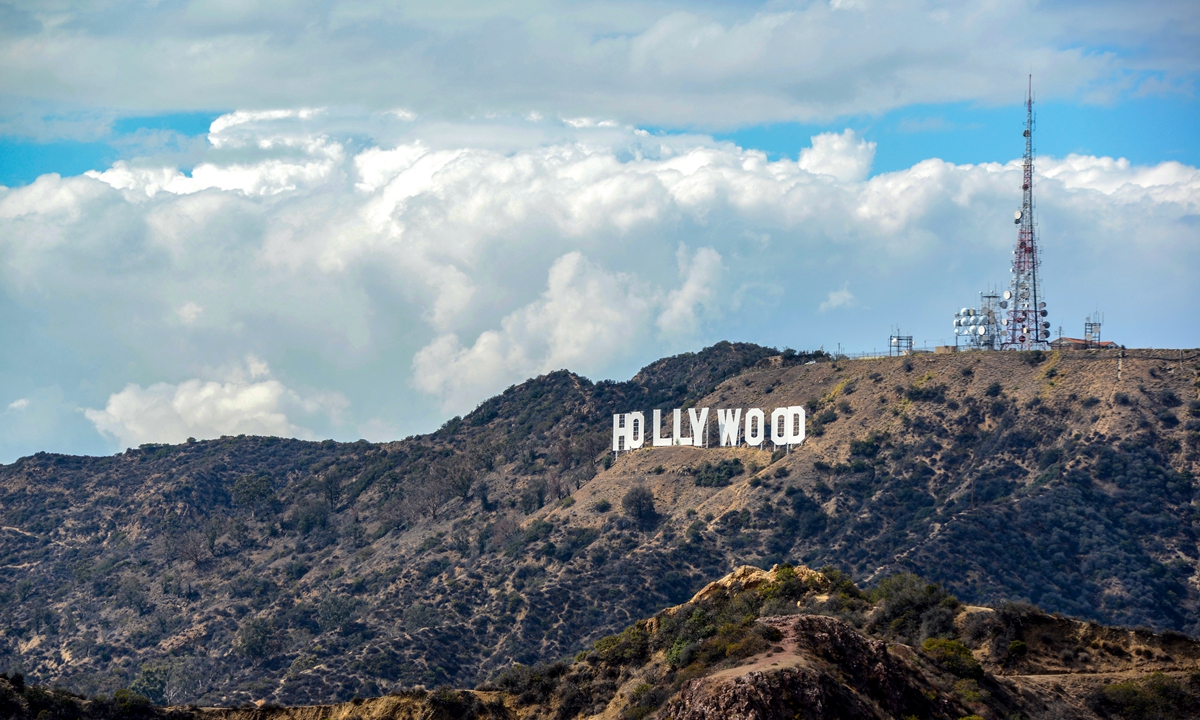
Picture of Hollywood. Photo:VCG
The White House appeared to walk back an announcement by US President Donald Trump that he would slap 100 percent tariffs on foreign-produced films to boost Hollywood, USA Today reported on Monday.
Both Trump and the White House on Monday walked back the idea that the tariffs were certain to be adopted, CNBC also reported on Monday.
The US government's mixed messages on the plan to impose tariffs on films came as the plan has raised concerns and confusion across the global film industry, including within the US itself. The proposed move will set a dangerous precedent, marking an escalation of US trade protectionism from goods to services, and will ultimately harm the American movie industry, a Chinese expert said.
White House spokesman Kush Desai said that "no final decision on foreign film tariffs has been made."
"The Administration is exploring all options to deliver on President Trump's directive to safeguard our country's national and economic security while Making Hollywood Great Again," he said on Monday, according to CNBC.
Following uproar over his post late Sunday, Trump dialed back his rhetoric on Monday. The president said he would ask Hollywood studios if "they're happy" with his proposal to impose tariffs of 100 percent on films made outside of the US, CNBC reported.
"I'm not looking to hurt the industry, I want to help the industry," Trump told reporters at the White House, according to CNBC.
On Sunday, Trump announced on his Truth Social platform that he has authorized the Commerce Department and US Trade Representative to begin the process of instituting a 100 percent tariff on films that are produced in foreign lands and imported into America.
"The mixed messages from the US administration highlight that the proposed movie tariffs, like many other tariffs they have imposed or plan to impose, are impractical and will eventually backfire on the US itself," Li Yong, a senior research fellow at the China Association of International Trade, told the Global Times on Tuesday, noting that the idea of a movie tariff is short sighted and narrow minded, once again revealing the new US administration's lack of a clear understanding of how the US industry functions as an integral part of the global supply chain.
'Self-hurting game'
In response to the US president's new tariff signal, shares of several major media and entertainment companies declined further in Tuesday's pre-market trading, extending losses from Monday. Walt Disney dipped 0.17 percent, while IMAX dropped 1.36 percent.
On Monday, streaming pioneer Netflix, which relies on global operations to produce content for international audiences, posted a 2 percent decline in its stock. Disney and Universal-owner Comcast edged lower, Reuters reported.
US media are also digesting the messages from the US government on movie tariffs. NBC News reported on Tuesday that the US president's Hollywood tariffs announcement was met with confusion and fear.
The Wall Street Journal on Tuesday used the headline "Hollywood Wanted Trump to Bring Movie-Making Back to the U.S.—but Not Like This," noting that "Actors and executives working on the issue wanted tax incentives, not tariffs."
Another report by Bloomberg said the US president's announcement that "he wants to impose a 100 percent tariff on films produced overseas sent the shares of media and entertainment companies such as Netflix down on Monday. Still, industry executives, analysts and government officials had no clear idea of how such a tariff would work — given the interconnected nature of film production — nor how such movies would be valued for tariff collection."
However, tariffs on movies might prove particularly hard to implement, Reuters reported.
One studio executive compared movie production to auto manufacturing, with various pieces - filming, visual effects and other elements - completed around the world, then assembled, through post production, in the US, the report said.
The US' plan to impose tariffs on foreign-produced films will not strengthen Hollywood, but rather have the opposite effect, Chinese experts said.
The US proposed tariffs on films will set a dangerous precedent and signal an escalation of US trade protectionism, extending from goods to services, Zhang Monan, deputy director of the Institute of American and European Studies at the China Center for International Economic Exchanges in Beijing, told the Global Times on Tuesday.
The move could trigger trade disputes and retaliatory measures from other countries, such as film import quotas or tariffs on US films, Zhang said. "More critically, it risks weakening the structure and competitiveness of the American film industry. Hollywood, a key tool for exporting US values and culture, could see its global market share shrink, undermining both the industry and America's cultural soft power," the expert noted.
Given the film industry's globalized nature, with cross-border collaboration essential across writing, directing, and production, unilateral tariffs would disrupt international cooperation, the expert warned. "Such unilateral actions amount to cultural isolationism and could severely harm Hollywood, which relies on global audiences to sustain its ecosystem, something the US domestic market alone cannot support," she said.

